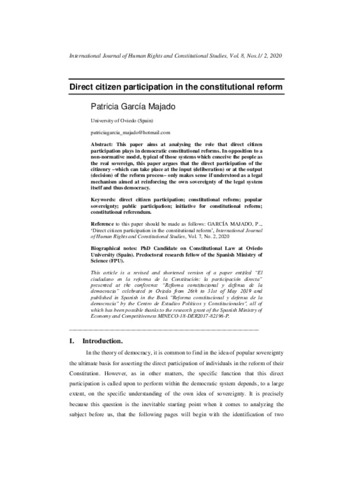Direct citizen participation in the constitutional reform
Autor(es) y otros:
Palabra(s) clave:
Constitutional amendment
Constitutional reform
Direct citizen participation
Popular sovereignty
Fecha de publicación:
Versión del editor:
Citación:
Resumen:
This paper aims at analysing the role that direct citizen participation plays in democratic constitutional reforms. In opposition to a non-normative model, typical of those systems which conceive the people as the real sovereign, this paper argues that the direct participation of the citizenry –which can take place at the input (deliberation) or at the output (decision) of the reform process– only makes sense if understood as a legal mechanism aimed at reinforcing the own sovereignty of the legal system itself and thus democracy.
This paper aims at analysing the role that direct citizen participation plays in democratic constitutional reforms. In opposition to a non-normative model, typical of those systems which conceive the people as the real sovereign, this paper argues that the direct participation of the citizenry –which can take place at the input (deliberation) or at the output (decision) of the reform process– only makes sense if understood as a legal mechanism aimed at reinforcing the own sovereignty of the legal system itself and thus democracy.
ISSN:
Patrocinado por:
This article is a revised and shortened version of a paper entitled “El ciudadano en la reforma de la Constitución: la participación directa” presented at the conference “Reforma constitucional y defensa de la democracia” celebrated in Oviedo from 26th to 31st of May 2019 and published in Spanish in the Book "Reforma constitucional y defensa de la democracia" by the Centro de Estudios Políticos y Constitucionales", all of which has been possible thanks to the research grant of the Spanish Ministry of Economy and Competitiveness MINECO-18-DER2017-82196-P.
Colecciones
- Artículos [37548]
- Derecho Público [506]
- Investigaciones y Documentos OpenAIRE [8420]
Ficheros en el ítem




